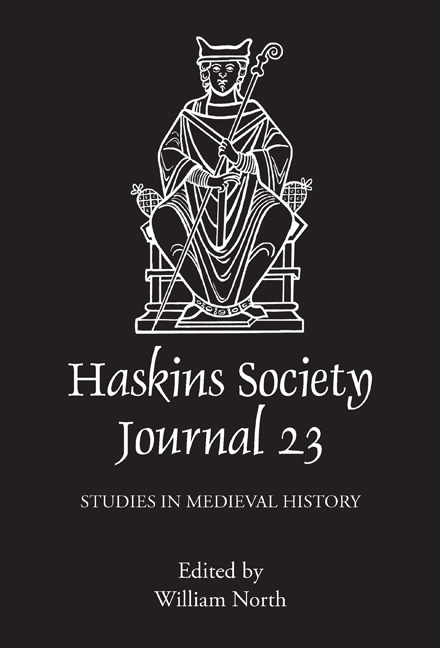Book contents
- Frontmatter
- Contents
- List of Figures
- Editor's Note
- Abbreviations
- 1 Francia and the History of Medieval Europe
- 2 Royal Control and the Disposition of Estates in Tenth-Century England: Reflections on the Charters of King Eadwig (955–959)
- 3 Denis Bethell Prize Essay: Frutolf of Michelsberg's Chronicle, the Schools of Bamberg, and the Transmission of Imperial Polemic
- 4 Manipulating Historical Memory: Cosmas on the Sees of Prague and Olomouc
- 5 Poetry and History: Baudry of Bourgueil, the Architecture of Chivalry, and the First Crusade
- Authors' Preface to Chapters 6 and 7
- 6 Men and Masculinities at the Courts of the Anglo-Norman Kings in the Ecclesiastical History of Orderic Vitalis
- 7 Men and Masculinities in William of Malmesbury's presentation of the Anglo-Norman Court
- 8 The Personnel of Comital Administration in Greater Anjou, 1129–1151
- 9 The Murder of Gilbert the Forester
- 10 The Object as Subject in Medieval Art
8 - The Personnel of Comital Administration in Greater Anjou, 1129–1151
Published online by Cambridge University Press: 05 November 2014
- Frontmatter
- Contents
- List of Figures
- Editor's Note
- Abbreviations
- 1 Francia and the History of Medieval Europe
- 2 Royal Control and the Disposition of Estates in Tenth-Century England: Reflections on the Charters of King Eadwig (955–959)
- 3 Denis Bethell Prize Essay: Frutolf of Michelsberg's Chronicle, the Schools of Bamberg, and the Transmission of Imperial Polemic
- 4 Manipulating Historical Memory: Cosmas on the Sees of Prague and Olomouc
- 5 Poetry and History: Baudry of Bourgueil, the Architecture of Chivalry, and the First Crusade
- Authors' Preface to Chapters 6 and 7
- 6 Men and Masculinities at the Courts of the Anglo-Norman Kings in the Ecclesiastical History of Orderic Vitalis
- 7 Men and Masculinities in William of Malmesbury's presentation of the Anglo-Norman Court
- 8 The Personnel of Comital Administration in Greater Anjou, 1129–1151
- 9 The Murder of Gilbert the Forester
- 10 The Object as Subject in Medieval Art
Summary
‘Our enemies are prévôts (prepositi), town officials (villici), and the other ministers (ministri) of our lord count.’ This complaint, voiced by an unwitting charcoal-burner during a conversation with the incognito Count Geoffrey V of Anjou, forms the centerpiece of a key anecdote in John of Marmoutier's Historia Gaufredi, in which the count learns of the abuses and extortions committed by his body of administrators against inhabitants of Loches.
While debate continues over the nature and extent of so-called bad or evil customs (malae consuetudines) and what they can reveal about an apparent breakdown in public authority and order from the ninth century to the twelfth, the evidence of contemporary charters to a certain extent bears out John's consternation. Loches provides just one example amongst many of the count having to discipline his own officers, for in 1136 Geoffrey's prévôt there had indeed been levying unjust customs from the monks of Marmoutier, John's own abbey.
Thomas Bisson has recently drawn attention to the propensity of Angevin comital officials in the twelfth century to exact such customs. In particular, local prévôts could exploit their positions of authority with impunity, not least because, Bisson suggests, their offices were in practice hereditary; together they formed a body of largely unaccountable men who used extortion and violence to carry out their duties and who, once in office, ‘would not easily give it up’.
- Type
- Chapter
- Information
- The Haskins Society Journal 232011. Studies in Medieval History, pp. 125 - 154Publisher: Boydell & BrewerPrint publication year: 2014



